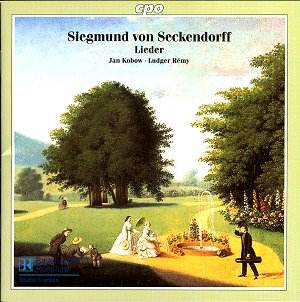I
am sure very few people have ever heard of Siegmund Freiherr von
Seckendorf. I certainly hadn’t. But then, he wasn’t a professional
composer. Carl Friedrich Siegmund von Seckendorf-Aberdar, as his
full name is, "set songs and singspiels by Goethe for the
first time in connection with the dinner parties of Duchess Anna
Amalia von Sachsen-Weimar. Later the former page Karl von Lyncker
wrote in his journal, ‘Goethe wrote and Seckendorff composed and
sang the most emotional songs for the beauties ... and when one
went through the streets on summer nights, the loveliest melodies
sounded from many windows’ ", says Siegrid Düll in the
booklet.
Seckendorf
studied law at Erlangen University and got in touch with music
at the court of Margravine Wilhelmine at Bayreuth. At the age
of 17 he started a military career, which lasted until 1774, when
he retired from the military. In 1775 he went to Weimar, where
he was promised the position of counsellor, which was given to
Goethe instead. He had to content himself with the modest position
of chamberlain. It gave him the opportunity to observe the life
at the court of the Duke of Sachsen-Weimar. Soon he became part
of the continuous programme of cultural and social activities.
It inspired him to write an article in the magazine ‘Das Journal
von Tiefurt’, with the title "Wie ist eine unoccupirte Gesellschaft
vor der Langeweile zu bewahren? " (How to prevent a company
which has no occupation from being bored to death?) – a typical
problem of 18th century aristocrats.
It
was Goethe who prevented Von Seckendorff getting a more interesting
(and better paid) job. Only in 1784 he was able to leave the court,
when he became ambassador of the Franconian district by order
of Frederick II of Prussia. But the year after he fell ill and
died.
The
rivalry with Goethe didn’t hold him back from writing dramas,
tragedies and poems and from composing songs – even on texts by
Goethe! - and singing and accompanying them himself. His writings
and compositions were exclusively meant for use at the court.
That partly explains their character. Most of the songs recorded
here are strophic, and there is little evidence of the influence
of the ‘Empfindsamkeit’ as we meet in the songs of his contemporary
Carl Philipp Emanuel Bach, for instance (see ‘Lieder & Oden’,
with Klaus Mertens and Ludger Rémy, also on CPO). There
is also a difference in the keyboard parts: in Von Seckendorff’s
songs there are still strong reminiscences of the old ‘basso-continuo’
practice, whereas Carl Philipp Emanuel Bach gives the keyboard
a much more independent role.
That
doesn’t mean, though, that Von Seckendorff’s songs are old-fashioned
or harmless. Some of them are ‘modern’ in the fascination for
spirits (Wilhelm’s Geist), night (Nacht-Ständchen) and death
(Darthulas Grabes-Gesang, one of the most dramatic songs). And
sometimes the keyboard does play a prominent role, like in ‘Antwort
im Traume’, where the instrumental epilogue is even longer than
the song itself.
Most
of the songs are of an intimate nature. They are intended to be
performed in the intimate atmosphere of a salon, and this recording
captures that atmosphere. Jan Kobow has a pleasant, rather light
voice, which is ideally suited to this music. The keyboard part
is realised with restraint - as intended by the composer - but
also with enough imagination to keep it interesting. Both musicians
have escaped the danger of ‘over-interpreting’ these songs – making
them more interesting or more dramatic than they are.
This
recording is a very worthwhile addition to the catalogue, giving
an insight into the world of the aristocracy during the time of
the German Enlightenment.
Johan
van Veen

